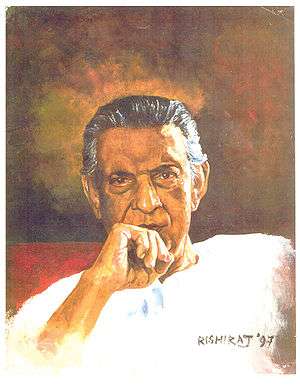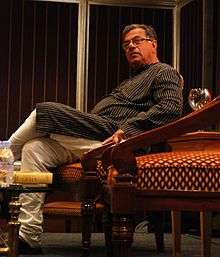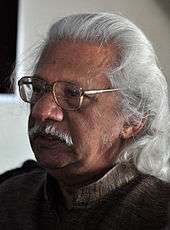National Film Award for Best Direction
| National Film Award for Best Direction | |
|---|---|
| Awarded by Directorate of Film Festivals | |
| Type | National |
| Category | Indian Cinema |
| Description | |
| Description | Excellence in cinematic direction achievement |
| Medal | Swarna Kamal (Golden Lotus) |
| Statistics | |
| Instituted | 1967 |
| First awarded | 1967 |
| Last awarded | 2015 |
| Total awarded | 50 |
| Cash award | ₹ 2,50,000/- |
| Previous name(s) | Award for excellence in direction (1967–76) |
| First awardee(s) | Satyajit Ray |
| Recent awardee(s) | Sanjay Leela Bhansali |
The National Film Award for Best Direction is one of the National Film Awards presented annually by the Directorate of Film Festivals, India, and was constituted in 1967. This is one of the Golden Lotus Awards (Swarna Kamal) given among National Film Awards. It is announced for films produced in a year across the country, in all Indian languages. As of 2014, Satyajit Ray is the most frequent winner with six awards,followed by the 5 time winner Adoor Gopalakrishnan.
The award winners for Best Direction are given below. The award comprises a Swarna Kamal (Golden Lotus) medallion, a cash prize of ₹ 2,50,000/- and a certificate.
Awards
Cash prize amount varied over the period. Following table illustrates the cash prize amount over the years:
| Year (Period) | Cash Prize |
|---|---|
| 1967 (15th) - 1972 (20th) | A plaque, ₹ 5,000 |
| 1973 (21st) - 1986 (34th) | Rajat Kamal and ₹ 20,000 |
| 1987 (35th) | Swarna Kamal and ₹ 25,000 |
| 1988 (36th) - 2005 (53rd) | Swarna Kamal and ₹ 50,000 |
| 2006 (54th) - present | Swarna Kamal and ₹ 2,50,000 |
Winners
| List of award recipients, showing the year (award ceremony), film(s), language(s) and citation | ||||||
|---|---|---|---|---|---|---|
| Year | Image | Director(s) | Film(s) | Language(s) | Citation | Refs. |
| 1967 (15th) |
 |
Satyajit Ray | Chiriyakhana | Bengali | – | [1] |
| 1968 (16th) |
 |
Satyajit Ray | Goopy Gyne Bagha Byne | Bengali | – | [2] |
| 1969 (17th) |
 |
Mrinal Sen | Bhuvan Shome | Hindi | – | [3] |
| 1970 (18th) |
 |
Satyajit Ray | Pratidwandi | Bengali | – | [4] |
| 1971 (19th) |
 |
Girish Karnad | Vamsha Vriksha | Kannada | – | [5] |
| – | B. V. Karanth | |||||
| 1972 (20th) |
 |
Adoor Gopalakrishnan | Swayamvaram | Malayalam | – | [6] |
| 1973 (21st) |
– | Mani Kaul | Duvidha | Hindi | – | [7] |
| 1974 (22nd) |
 |
Satyajit Ray | Sonar Kella | Bengali | – | [8] |
| 1975 (23rd) |
 |
Satyajit Ray | Jana Aranya | Bengali | – | [9] |
| 1976 (24th) |
– | P. Lankesh | Pallavi | Kannada | – | [10] |
| 1977 (25th) |
– | G. Aravindan | Kanchana Sita | Malayalam |
For its courageous and uncompromising exploration of an ancient epic through a pronouncedly new cinematic language, for making the camera speak more eloquently than the introspective characters of the Ramayana, for projecting the interior landscape of the protagonists against the vast backdrop of nature, for matching profound philosophical ideas with astonishing evocations of the beauties of the physical world. |
[11] |
| 1978 (26th) |
– | G. Aravindan | Thampu | Malayalam |
For creating a truly director's film which effectively brings out the pathos and ennui in the life of village circus artists and their audience. |
[12] |
| 1979 (27th) |
 |
Mrinal Sen | Ek Din Pratidin | Bengali | – | [13] |
| 1980 (28th) |
 |
Mrinal Sen | Akaler Shandhaney | Bengali |
For exploring the inevitable conflict between urban and rural cultures, for displaying in almost every sequence masterly handling and complete command over the medium. |
[14] |
| 1981 (29th) |
 |
Aparna Sen | 36 Chowringhee Lane | English |
For effectively orchestrating the creative and technical elements in her first film, for a poignant portrayal of loneliness in old age and for bringing to the screen a true-to-life situation in post-independence India. |
[15] |
| 1982 (30th) |
– | Utpalendu Chakrabarty | Chokh | Bengali |
For his merciless expose of several aspects of social injustice with admirable command over his medium. |
[16] |
| 1983 (31st) |
 |
Mrinal Sen | Khandhar | Hindi |
For its subtle blending of nostalgia and contemporary social comment and the powerful visual exploration of the theme. |
[17] |
| 1984 (32nd) |
 |
Adoor Gopalakrishnan | Mukhamukham | Malayalam | – | [18] |
| 1985 (33rd) |
 |
Shyam Benegal | Trikal | Hindi |
For the masterly treatment of an unusual story which, through subtle and sensitive handling, brings out the conflicts in a family trapped in strange memories and situations. |
[19] |
| 1986 (34th) |
– | G. Aravindan | Oridathu | Malayalam |
For his masterly and powerful depiction of changing society reeling under the onslaught of technical progress. |
[20] |
| 1987 (35th) |
 |
Adoor Gopalakrishnan | Anantaram | Malayalam |
For the exceptional mastery of the craft in dealing with a very complex and unusual subject for the cinema. |
[21] |
| 1988 (36th) |
 |
Shaji N. Karun | Piravi | Malayalam |
For remarkable success in accomplishing fusion of various elements and creating new heights of cinematic aesthetics. |
[22] |
| 1989 (37th) |
 |
Adoor Gopalakrishnan | Mathilukal | Malayalam |
For successfully capturing the spirit of the short story on his prison days by the celebrated writer Vaikkom Mohammed Basheer. |
[23] |
| 1990 (38th) |
– | Tapan Sinha | Ek Doctor Ki Maut | Hindi |
For having presented a contemporary problem with courage, subtlety and finesse. |
[24] |
| 1991 (39th) |
 |
Satyajit Ray | Agantuk | Bengali |
For the outstanding craftsmanship and the command over the language of cinema he employed in creating a remarkable cinematic experience. |
[25] |
| 1992 (40th) |
|
Goutom Ghosh | Padma Nadir Majhi | Bengali |
For his stunningly convincing realisation of Manik Bandopadhyay's novel into a breathtaking cinematic experience. |
[26] |
| 1993 (41st) |
 |
T. V. Chandran | Ponthan Mada | Malayalam |
For a masterly rendering of a whole range of human experience into celluloid poetry. |
[27] |
| 1994 (42nd) |
|
Jahnu Barua | Xagoroloi Bohudoor | Assamese |
For capturing Assamese life and reality in an original format uniquely associated with the director, and for enriching the spectrum of Indian Cinema thereby. |
[28] |
| 1995 (43rd) |
– | Saeed Akhtar Mirza | Naseem | Hindi |
For the deeply moving portrayal of a family in turmoil in the midst of communal disharmony with lyrical quality and brilliant cinematic touches. |
[29] |
| 1996 (44th) |
– | Agathiyan | Kadhal Kottai | Tamil |
For a brilliantly knit plot, maintaining the tempo and rhythms of an unusual love story till end. |
[30] |
| 1997 (45th) |
 |
Jayaraj | Kaliyattam | Malayalam |
For successfully transplanting the classic play by keeping the traditional "Theyyam" art form as a backdrop and weaving an extremely tight story, never losing control of the medium. |
[31] |
| 1998 (46th) |
– | Rajeevnath | Janani | Malayalam |
For a warmly compassionate film where subject and treatment are in perfect harmony. |
[32] |
| 1999 (47th) |
– | Buddhadeb Dasgupta | Uttara | Bengali |
For his skillful weaving together of different strands of life through metaphors, symbols and folk icons, to question the definition of humanity in our scoundrel times. |
[33] |
| 2000 (48th) |
 |
Rituparno Ghosh | Utsab | Bengali | For working with a large group of actors within the confines of a rambling old house. The director builds an unpretentious, gripping and entirely credible narrative and brings about in the process some extremely powerful performances. |
[34] |
| 2001 (49th) |
– | B. Lenin | Ooruku Nooruper | Tamil |
For telling the eventful story of a revolutionary who has killed for his cause and awarded the death sentence for his crime. It further looks at the issue of capital punishment. |
[35] |
| 2002 (50th) |
 |
Aparna Sen | Mr. and Mrs. Iyer | English |
For her effective and subtle handling of people caught in a trying and difficult times. |
[36] |
| 2003 (51st) |
|
Goutom Ghosh | Abar Aranye | Bengali |
For his complex weaving of human destines across a wide range of socio-political and cinematic histories. |
[37] |
| 2004 (52nd) |
– | Buddhadeb Dasgupta | Swapner Din | Bengali |
For his appropriate usage of metaphors and complex handling of socio political situation present in West Bengal in a language simultaneously cinematic and poetic. |
[38] |
| 2005 (53rd) |
 |
Rahul Dholakia | Parzania | English |
For the compelling documentation of contemporary human lives trapped in difficult times of communal hatred and violence. |
[39] |
| 2006 (54th) |
|
Madhur Bhandarkar | Traffic Signal | Hindi |
For weaving in the lives, livelihoods and concerns of the street dwellers in a metro and the inspiring stand that makes the protagonist a role model across society. |
[40] |
| 2007 (55th) |
 |
Adoor Gopalakrishnan | Naalu Pennungal | Malayalam |
For his delicate and subtle handling of gender issues in a conventional society. Four women of different marital status are trivialized and subjected to abject neglect by their immediate partners and family. |
[41] |
| 2008 (56th) |
Bala | Naan Kadavul | Tamil |
For its powerful handling of an extraordinary subject that focuses on marginal characters with great convection. |
[42] | |
| 2009 (57th) |
 |
Rituparno Ghosh | Abohoman | Bengali |
For the many layered narrative of emotional conflict, rich texture and ensemble performances. |
[43] |
| 2010 (58th) |
 |
Vetrimaaran | Aadukalam | Tamil |
For a gritty tale of love, jealousy and betrayal in the midst of bloodsport and violence, in the manner of realistic cinema. |
[44] |
| 2011 (59th) |
– | Gurvinder Singh | Anhe Ghore Da Daan | Punjabi |
For its haunting portrayal of the lives of people in a village as they battle with the reality of large scale industrial development. The director deploys an inventive storytelling form where sound, space and body operate distinctly to frame the experience of a fragile existence. Each face portrayed in the film carries the signs of persistent trauma. This is an aesthetic tour de force that confidently and successfully reinvents the contours of Indian experimental cinema. |
[45] |
| 2012 (60th) |
– | Shivaji Lotan Patil | Dhag | Marathi |
The stark reality of a crematorium and its inhabitants who conduct the last rites form the core of this remarkable film that tugs at your heart. The director's creative craft pervades in all its ramifications throughout this brilliant film. |
[46] |
| 2013 (61st) |
– | Hansal Mehta | Shahid | Hindi |
A remarkably handled film that traces the true story of a slain human right activist and a lawyer Shahid Azmi in the backdrop of communal violence unleashed in Mumbai. The story of an impoverished Muslim struggling to come to terms with injustice, inequality and rise above his circumstances. It is an inspiring testament to the human spirit. |
[47] |
| 2014 (62nd) |
– | Srijit Mukherji | Chotushkone | Bengali |
For its brilliantly reflexive use of the cinematic idiom through a playful and innovative mise-en-scene that tautens to an unexpected and gripping climax. |
[48] |
| 2015 (63rd) |
 |
Sanjay Leela Bhansali | Bajirao Mastani | Hindi |
For the masterful handling of all aspects of the medium of cinema to weave a tragic love story within a grand historic drama. |
[49] |
References
- ↑ "15th National Film Awards" (PDF). International Film Festival of India. p. 2,9. Retrieved September 21, 2011.
- ↑ "16th National Film Awards" (PDF). Directorate of Film Festivals. p. 2. Retrieved September 22, 2011.
- ↑ "17th National Film Awards" (PDF). Directorate of Film Festivals. p. 2,6. Retrieved September 26, 2011.
- ↑ "18th National Film Awards" (PDF). Directorate of Film Festivals. p. 2. Retrieved September 26, 2011.
- ↑ "World Theatre Ambassador Girish Karnad @ International Theatre Institute ITI". Retrieved May 18, 2012.
- ↑ "20th National Film Awards". International Film Festival of India. p. 2. Retrieved September 26, 2011.
- ↑ "21st National Film Awards" (PDF). Directorate of Film Festivals. p. 2,32. Retrieved September 29, 2011.
- ↑ "22nd National Film Awards" (PDF). Directorate of Film Festivals. p. 2,33. Retrieved October 1, 2011.
- ↑ "23rd National Film Awards" (PDF). Directorate of Film Festivals. p. 1. Retrieved October 4, 2011.
- ↑ "Moments of epiphany". Uma Mahadevan-Dasgupta. The Hindu. Jan 30, 2005. Retrieved May 18, 2012.
- ↑ "25th National Film Awards" (PDF). Directorate of Film Festivals. p. 2,44. Retrieved October 4, 2011.
- ↑ "26th National Film Awards" (PDF). Directorate of Film Festivals. Retrieved October 4, 2011.
- ↑ "Ek Din Pratidin @ MrinalSen.org".
- ↑ "28th National Film Awards" (PDF). Directorate of Film Festivals. p. 6. Retrieved October 4, 2011.
- ↑ "29th National Film Awards" (PDF). Directorate of Film Festivals. p. 4. Retrieved October 4, 2011.
- ↑ "30th National Film Awards" (PDF). Directorate of Film Festivals. p. 6. Retrieved October 4, 2011.
- ↑ "31st National Film Awards" (PDF). Directorate of Film Festivals. p. 6. Retrieved December 9, 2011.
- ↑ "32nd National Film Awards" (PDF). Directorate of Film Festivals. p. 7. Retrieved January 6, 2012.
- ↑ "33rd National Film Awards" (PDF). Directorate of Film Festivals. pp. 8–9. Retrieved January 7, 2012.
- ↑ "34th National Film Awards" (PDF). Directorate of Film Festivals. pp. 10–11. Retrieved January 7, 2012.
- ↑ "35th National Film Awards" (PDF). Directorate of Film Festivals. pp. 12–13. Retrieved January 9, 2012.
- ↑ "36th National Film Awards" (PDF). Directorate of Film Festivals. pp. 12–13. Retrieved January 9, 2012.
- ↑ "37th National Film Awards" (PDF). Directorate of Film Festivals. pp. 12–13. Retrieved January 29, 2012.
- ↑ "38th National Film Awards" (PDF). Directorate of Film Festivals. pp. 14–15. Retrieved January 9, 2012.
- ↑ "39th National Film Awards" (PDF). Directorate of Film Festivals. pp. 14–15. Retrieved February 27, 2012.
- ↑ "40th National Film Awards" (PDF). Directorate of Film Festivals. pp. 14–15. Retrieved March 2, 2012.
- ↑ "41st National Film Awards" (PDF). Directorate of Film Festivals. pp. 12–13. Retrieved March 3, 2012.
- ↑ "42nd National Film Awards" (PDF). Directorate of Film Festivals. pp. 6–7. Retrieved March 5, 2012.
- ↑ "43rd National Film Awards" (PDF). Directorate of Film Festivals. pp. 6–7. Retrieved March 6, 2012.
- ↑ "44th National Film Awards" (PDF). Directorate of Film Festivals. pp. 6–7. Retrieved January 9, 2012.
- ↑ "45th National Film Awards" (PDF). Directorate of Film Festivals. pp. 6–7. Retrieved March 11, 2012.
- ↑ "46th National Film Awards" (PDF). Directorate of Film Festivals. pp. 6–7. Retrieved March 12, 2012.
- ↑ "47th National Film Awards" (PDF). Directorate of Film Festivals. pp. 6–7. Retrieved March 13, 2012.
- ↑ "48th National Film Awards" (PDF). Directorate of Film Festivals. pp. 22–23. Retrieved March 13, 2012.
- ↑ "49th National Film Awards" (PDF). Directorate of Film Festivals. pp. 18–19. Retrieved March 14, 2012.
- ↑ "50th National Film Awards" (PDF). Directorate of Film Festivals. pp. 18–19. Retrieved March 14, 2012.
- ↑ "51st National Film Awards" (PDF). Directorate of Film Festivals. pp. 10–11. Retrieved March 15, 2012.
- ↑ "52nd National Film Awards" (PDF). Directorate of Film Festivals. pp. 10–11. Retrieved January 28, 2012.
- ↑ "53rd National Film Awards" (PDF). Directorate of Film Festivals. pp. 10–11. Retrieved March 19, 2012.
- ↑ "54th National Film Awards" (PDF). Directorate of Film Festivals. pp. 8–9. Retrieved March 24, 2012.
- ↑ "55th National Film Awards" (PDF). Directorate of Film Festivals. pp. 14–15. Retrieved March 26, 2012.
- ↑ "56th National Film Awards" (PDF). Directorate of Film Festivals. pp. 14–15. Retrieved March 27, 2012.
- ↑ "57th National Film Awards" (PDF). Directorate of Film Festivals. pp. 48–49. Retrieved March 28, 2012.
- ↑ "58th National Film Awards, 2010" (PDF). Directorate of Film Festivals. Retrieved March 29, 2012.
- ↑ "59th National Film Awards for the Year 2011 Announced". Press Information Bureau (PIB), India. Retrieved March 7, 2012.
- ↑ "60th National Film Awards Announced" (PDF) (Press release). Press Information Bureau (PIB), India. Retrieved 18 March 2013.
- ↑ "61st National Film Awards" (PDF). Directorate of Film Festivals. 16 April 2014. Retrieved 16 April 2014.
- ↑ "62nd National Film Awards" (PDF) (Press release). Directorate of Film Festivals. 24 March 2015. Retrieved 24 March 2015.
- ↑ "63rd National Film Awards" (PDF) (Press release). Directorate of Film Festivals. 28 March 2016. Retrieved 28 March 2016.